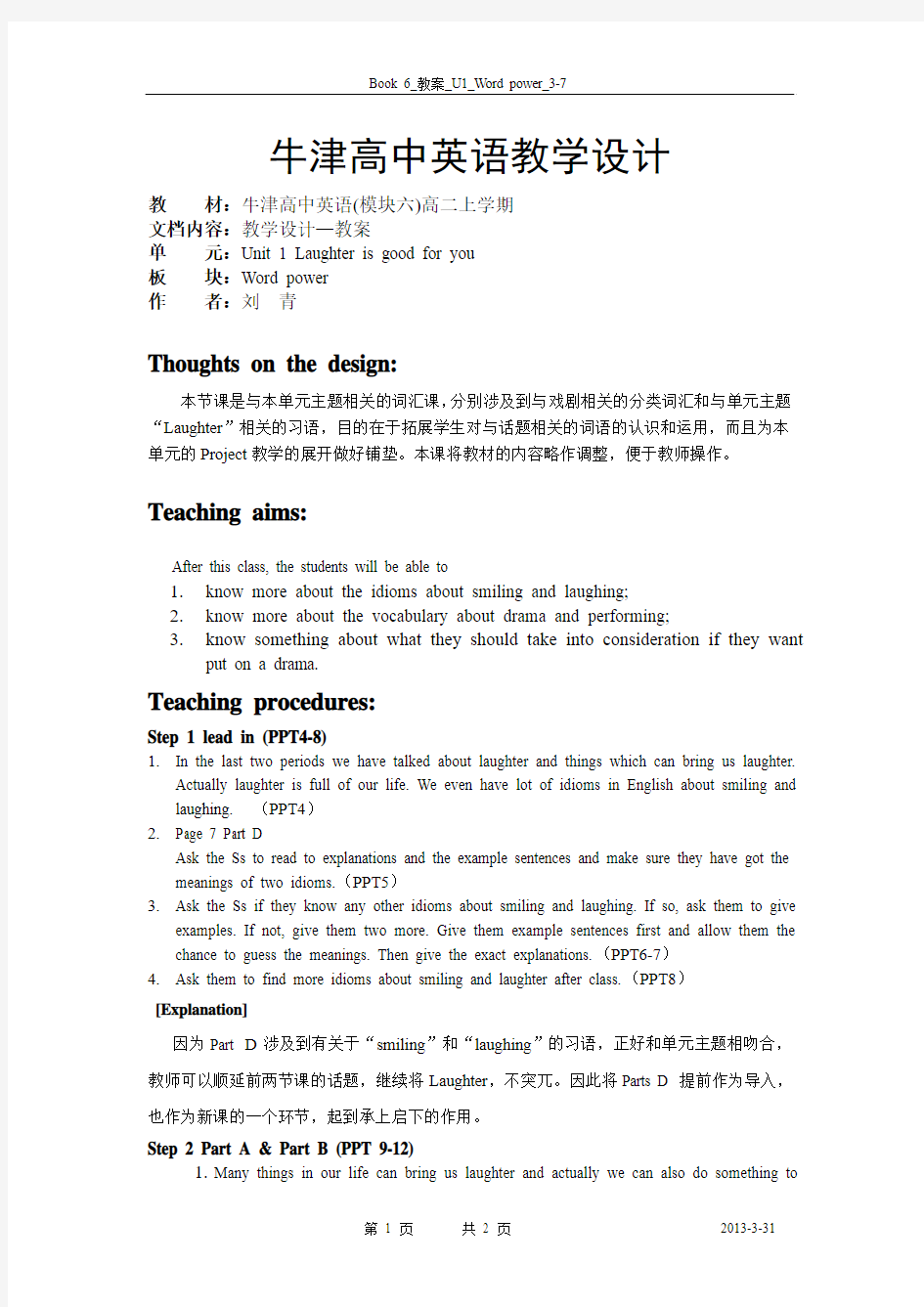Book 6_U1_Word power


牛津高中英语教学设计
教材:牛津高中英语(模块六)高二上学期
文档内容:教学设计—教案
单元:Unit 1 Laughter is good for you
板块:Word power
作者:刘青
Thoughts on the design:
本节课是与本单元主题相关的词汇课,分别涉及到与戏剧相关的分类词汇和与单元主题“Laughter”相关的习语,目的在于拓展学生对与话题相关的词语的认识和运用,而且为本单元的Project教学的展开做好铺垫。本课将教材的内容略作调整,便于教师操作。
Teaching aims:
After this class, the students will be able to
1.know more about the idioms about smiling and laughing;
2.know more about the vocabulary about drama and performing;
3.know something about what they should take into consideration if they want
put on a drama.
Teaching procedures:
Step 1 lead in (PPT4-8)
1.In the last two periods we have talked about laughter and things which can bring us laughter.
Actually laughter is full of our life. We even have lot of idioms in English about smiling and laughing. (PPT4)
2.Page 7 Part D
Ask the Ss to read to explanations and the example sentences and make sure they have got the meanings of two idioms.(PPT5)
3.Ask the Ss if they know any other idioms about smiling and laughing. If so, ask them to give
examples. If not, give them two more. Give them example sentences first and allow them the chance to guess the meanings. Then give the exact explanations.(PPT6-7)
4.Ask them to find more idioms about smiling and laughter after class.(PPT8)[Explanation]
因为Part D涉及到有关于“smiling”和“laughing”的习语,正好和单元主题相吻合,教师可以顺延前两节课的话题,继续将Laughter,不突兀。因此将Parts D 提前作为导入,也作为新课的一个环节,起到承上启下的作用。
Step 2 Part A & Part B (PPT 9-12)
1.Many things in our life can bring us laughter and actually we can also do something to
amuse others and ourselves, for example, we can put on performances or a drama. How much do you know about drama and what should you prepare if you want to put on a drama? Now, can you answer these questions? (PPT9-11)
(1)What are all the actors in a play called?
(2)What do we call the person who acts in a play?
(3) What do we call the person who is in charge of a play?
(4) What will an actor read in a script?
(5) What are acts and scenes in a play?
(6) What kind of play is called one-act plays?
See how many questions the Ss can answer, then ask them to read Part A and get all the answers.
Keys: (1) The cast (2) An actor or an actress (3) The director
(4) Lines and stage direction
(5)Acts are like chapters in a book and are made up of different scenes.
Scenes are like paragraphs in a chapter.
(6) Very short plays in which all the action occurs at one time, in one place.
2. Look at Part B and make sure the Ss understand what each word means.(PPT12)[Explanation]
先提出问题,学生有些能回答有些不能,他们的求知欲望会被激发,然后在阅读Part A效果会更好。Part B结合图画学生能较快的得到各个词汇的具体含义,因此不需要过多的花精力。
Step 3 Part C Application(PPT13)
Ask the Ss to finish Part C using the words mentioned above.
[Explanation]
这一部分根据教材的编排,让学生将所了解的词汇进行运用。
Step 4 Discussion(PPT14)
What should we consider if we want to put on a drama?
The Ss may come up with “cast”, “script”and “stage”, remind them that they may have to consider some other things, like “budget”, “costumes” and so on. [Explanation]
本部分是作为一个总结,考查学生是否真正理解了本课所涉及的词汇,并能进行正确分类。以讨论的形式给学生提供交流的机会,可以在小组内进行信息交流和相互补充。此外,这一部分的设计让学生对要筹备戏剧的演出该做哪些准备有一定的思考,为Project的教学做好铺垫。
Step 5 Homework (PPT15)
1. Find more idioms about smiling and laughing;
2. Review all the expressions related to drama and performing.
[Explanation]
家庭作业的布置是课堂的延伸,对课堂教学的内容的巩固。
